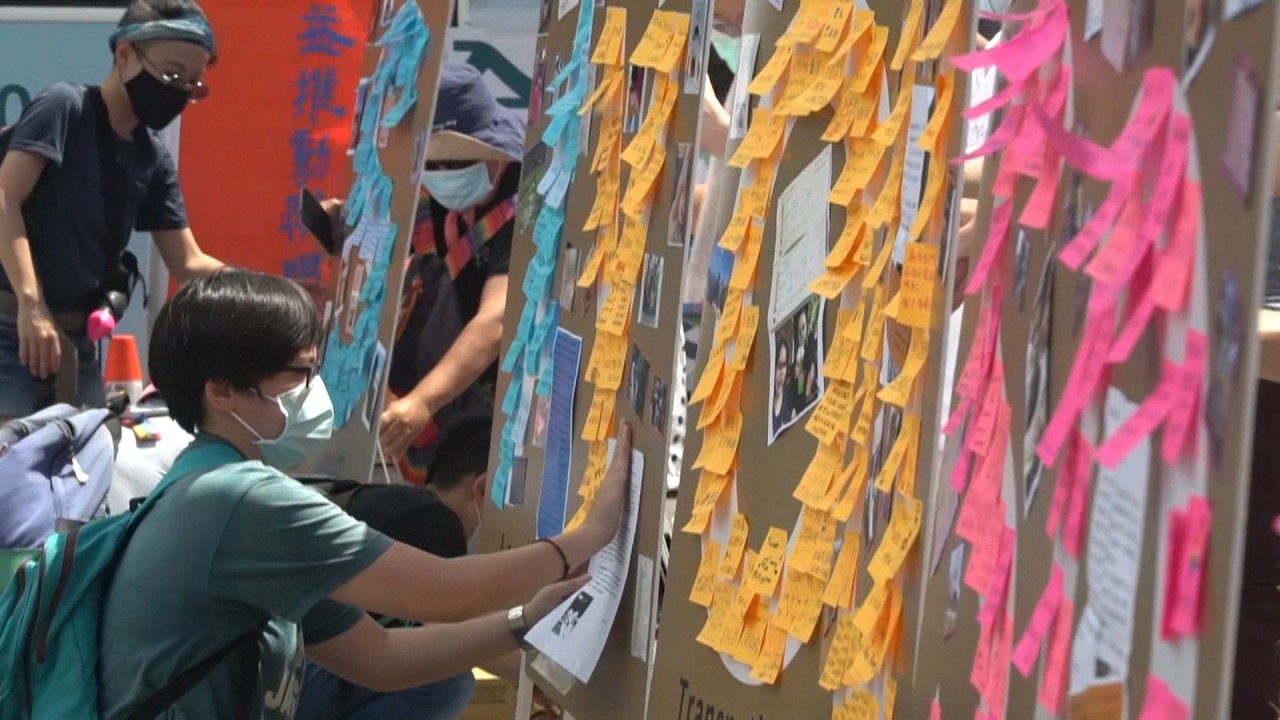
‘We should not tolerate this’: Chinese activist to appeal case against publisher of homophobic textbook
- Xixi sued university press and online retailer JD.com over the widely used textbook that lists homosexuality as a ‘psychosexual disorder’
- The 23-year-old lost the case, but says she has received a lot of support and will continue the legal battle
It was in a debate class at university in Guangzhou when Xixi realised what she was up against.
The topic for debate: do homosexual families count as real families?
Her first year at university, it was a confronting moment listening to some of her classmates attacking gay people.
“It’s a psychosexual disorder. How can these people be allowed to marry?” one of them asked.
Xixi’s classmates did not know she was gay, and it was only later while talking to friends that she realised this remark had actually come from a textbook.
Published by Jinan University Press in Guangzhou, the 2013 edition of Mental Health Education for College Students lists homosexuality under “common psychosexual disorders” – along with cross-dressing and fetishism. It states that “homosexuality is believed to be a disruption of love and sex, or perversion of the sex partner”.
The textbook is used by a number of Chinese universities and Xixi – not her real name – was concerned that it was perpetuating the belief that being gay is wrong.
“[This can lead to] hospitals and counsellors deciding to use so-called medical treatment for homosexuals,” she said, referring to gay people being forced to have controversial treatment such as “conversion therapy”.

After seeking legal advice, Xixi in 2016 decided to sue the university publishing house and online retailer JD.com, which sells the textbook, on the grounds that it was “poor quality”.
It took until July this year for the case to finally be heard.
But last week, the Suyu District People’s Court in Suqian, Jiangsu province ruled in favour of Jinan University Press and JD.com that the textbook’s description of homosexuality as a “psychosexual disorder” was a matter of “cognitive dissonance” rather than a “factual error”.
Xixi, who is now 23, says she is preparing to appeal the case with her lawyers.
JD.com declined to comment on the case, while Jinan University could not be reached.
Yu Liying, one of the lawyers, said cases concerning sexual minorities were always difficult in China. “Previously we had a case where the word ‘homosexual’ appeared in the statement and our filing was rejected by the court,” she said.
Explained: gay rights, LGBTQ and same-sex marriage in Asia
In Xixi’s case, since there is no law in China recognising homosexuality or gender diversity, her lawyers had argued that the textbook’s description of homosexuality was faulty and that it contained a number of other mistakes that meant it did not meet book quality standards.
According to the court’s closing statement obtained by the South China Morning Post, the ruling was made on technical grounds. The court detailed how the word usage and grammar in the textbook were correct, and concluded that there was no “quality issue”.
It rejected Xixi’s evidence that homosexuality is not a disease, saying it was not relevant to the case. The court concluded that “the academic viewpoints and cognitive dissonance aren’t part of the review responsibilities of Jinan University Press”.

01:18
Taiwan marks anniversary of Asia's first law legalising gay marriage
Yu said she was disappointed with how the court had handled the case. It had not recognised Xixi’s evidence or allowed her lawyers to cross-examine the defendants, she said, and no professional organisation had been found to proofread the textbook – a legal requirement.
“There are defects in the court’s procedure, which will give us an advantage when we appeal the case,” Yu said.
China decriminalised homosexuality in 1997 and it was only removed from a list of mental illnesses in 2001. But homosexuals who are “discordant with themselves” or who feel anxious or depressed because of their sexuality are still listed in the official Chinese Classification of Mental Disorders. Some clinics, therapists and textbooks still use this as a basis to “treat” gay people, including through shock or aversion therapy and drugs.
The World Health Organisation has completely depathologised homosexuality.

02:03
Billboard campaign protests gay ‘conversion therapy’ in China
Xixi is not the first to take on a Chinese textbook publisher over homophobic descriptions. A student identified as Qiubai sued the Guangdong Higher Education Publishing House in a similar case in 2015, but it was rejected by the Guangzhou Tianhe District Court. She then sued the Ministry of Education, accusing it of inaction, but lost the case and a subsequent appeal in 2017.
China’s LGBT activists step up push for gay marriage after official rejects change
For Xixi, although the court ruled against her, the case has served its purpose. She said her lawyers had read her entire statement in court about how homosexuality had been stigmatised (it concluded that “we should not tolerate discrimination, we should make changes”), and she had received a lot of support from the community and online. She said the education and advocacy aspects of the case were more meaningful than the court’s decision.
Yu, her lawyer, agreed.
“It was the same for Qiubai’s case. Even though she lost in court, we had media reports and discussions within the community, and it even influenced people who might not have paid much attention to LGBTQ issues previously,” she said. “So the advocacy has been successful.”

.jpg?itok=H5_PTCSf&v=1700020945)